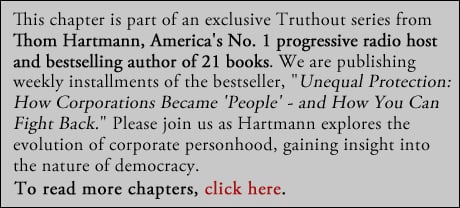Part of the Series
Thom Hartmann | Unequal Protection: How Corporations Became 'People' and How You Can Fight Back
Did you know that Truthout is a nonprofit and independently funded by readers like you? If you value what we do, please support our work with a donation.
The statistic in this chapter’s epigraph is sobering indeed. It says corporations sought protection under the Fourteenth Amendment a hundred times more often than did the people it was intended to protect. And this is not a victimless shift—there have been real and substantial consequences. In the years following the Santa Clara decision and the cases that referred to it, companies have used their personhood rights in an amazing variety of ways. What follows in this chapter is a small selection.
First Amendment
Supreme Court Justice Oliver Wendell Holmes Jr. noted in the landmark 1919 Shenck v. United States case that shouting “Fire!” in a crowded theater does not constitute free speech; the Bill of Rights guarantees that a person’s opinion can be expressed, not that there are no limits on what one can do. But consider how this fundamental freedom has been bent by corporations since Santa Clara.
By claiming the same right as humans to express themselves, companies won approval to spend whatever they want on lobbyists in Washington. At one point there was a full-time tobacco lobbyist for every two legislators on Capitol Hill. As of 2005 there were roughly 64 registered lobbyists for every member of Congress, and 138 of them are former members of Congress. Include state lobbyists, and there are more than 60,000 (because of variations in state laws on what is or isn’t a lobbyist, and who and how they should register, this may well be a significant underestimate: nobody really knows the true number).1
As Jeffrey H. Birnbaum noted in the Washington Post in June 2005, “The number of registered lobbyists in Washington has more than doubled since 2000 to more than 34,750 while the amount that lobbyists charge their new clients has increased by as much as 100 percent. Only a few other businesses have enjoyed greater prosperity in an otherwise fitful economy.”2
He added that “lobbying firms can’t hire people fast enough” and that salaries started at $300,000 a year. “Big bucks lobbying is luring nearly half of all lawmakers who return to the private sector when they leave Congress,” Birnbaum noted, citing a study by Public Citizen’s Congress Watch. The situation has only gotten worse since then.
And in a bizarre twist, during the administration of George W. Bush more than a hundred very well-paid lobbyists decided to forsake their big pay checks for, relatively speaking, paltry Civil Service paychecks for a year or two to become the actual regulators for the agencies they used to lobby.
J. Steven Griles, for example, moved from a $585,000-per-year paycheck as a lobbyist for oil and gas interests to become the number two person in the Department of the Interior, right under Interior Secretary Gale Norton. The Department then opened 8 million acres of western lands for oil and gas exploration and gave $2 million in no-bid contracts to one of Griles’s former clients—and Griles continued to receive a four-year $284,000-per-year bonus from his former employer.
Charles Lambert, a fifteen-year lobbyist for the meat industry in its effort to block labeling and mad cow disease investigations, went to work for the U.S. Department of Agriculture (USDA), where he officially determined that mad cow disease wasn’t a threat and shouldn’t be investigated and that meat shouldn’t be labeled with regard to its safety.
Watch: Thom Hartmann: The $1 Million Corporate Personhood Mystery
Daniel E. Troy worked for a lobbying firm representing Pfizer, Eli Lilly, and others. In 2001 he left the lobbying firm and became the top lawyer (chief counsel) for the Food and Drug Administration (FDA). Mysteriously, the FDA’s position on regulating the drug companies became that it wants “to discourage frivolous lawsuits, which drive up costs,” making it harder for consumers damaged by prescription drug side effects to sue Troy’s former employers.
Lobbyist Thomas A. Scully represented HCA, a huge hospital corporation originally started by Bill Frist’s family; HCA was embroiled in a fraud investigation by the Federal Centers for Medicare and Medicaid Services, started by a whistleblower, that looked like it was going to cost HCA $250 million. In 2001 Scully left his job to head the Federal Centers for Medicare and Medicaid Services. By coincidence, the agency worked out a settlement that kept the feds from looking further into HCA’s books and kept the Justice Department away. Scully then left the Centers for Medicare and Medicaid and is working again as a lobbyist for Medicare providers.
Lobbyist Jeffrey Holmstead had represented big utility companies and as a lawyer for them had proposed twelve paragraphs of changes in EPA regulations affecting those utilities. Holmstead then went to work for the EPA as a regulator, and soon thereafter those twelve paragraphs—which gave a pollution exemption to 168 of 232 western-based power plants—appeared in proposed EPA rules changes. The case was so blatant that forty-five U.S. senators—including three Republicans—and ten states’ attorneys general wrote a letter asking the EPA to void the proposed rule because of “undue industry influence.” Their complaints were largely ignored by the Bush administration.3
The American Academy of Pediatrics has proposed that the federal government initiate controls on advertising directed at children and has recommended that parents educate their children about how advertising can manipulate them. Corporations, using their First Amendment rights to freedom of expression, have instead increased their spending on ads to children.4
The California Public Utilities Commission ordered a public utility to include a statement-stuffer in its bills, informing consumers of a key point. In a move that was startlingly reminiscent of the Santa Clara case, the utility (a corporate monopoly) sued the state and took the case all the way to the U.S. Supreme Court—and won. The utility asserted that it didn’t have to comply because it had a First Amendment right “not to speak” and so could avoid informing its customers about issues as it chose. The Supreme Court, extending the logic of the Santa Clara case, agreed.5
Lawyers at a 1988 judicial conference recommended that corporations “use the First Amendment to invalidate a range of Federal regulations, including Securities and Exchange Commission disclosure requirements that govern corporate takeovers, and rules affecting stock offerings.”6 Since that time, this has become a routine claim made by corporations.
Fourth Amendment
The Fourth Amendment, instituted to prevent government agents from bursting into homes and unreasonably searching and seizing property, has been used by corporations to avoid government regulators as if they were British dragoons.
Supreme Court cases in 1967 and 1978 affirmed that corporations do not have to submit to random inspections because, as persons, they are entitled to privacy and freedom from unreasonable searches.7 Corporations have pursued this logic for many years. Referencing the 1886 Santa Clara decision, the Supreme Court granted Fourth Amendment privacy rights to a corporation in 1906, just sixteen years after the Sherman Act had been passed.8 As William Meyers notes in The Santa Clara Blues: Corporate Personhood versus Democracy, “This ruling made it difficult to enforce the Sherman anti-monopoly act, which naturally required the papers of corporations in order to determine if there existed grounds for an indictment.”9
An electrical and plumbing corporation in Idaho cited the Fourth Amendment and deterred a health and safety investigation.10
In a 1986 Supreme Court case, a corporation sued the Environmental Protection Agency because the EPA hired a professional photographer to fly over the plant with a camera after the corporation had turned down a request by the EPA for an on-site inspection. The Court acknowledged the corporation’s right to privacy from inspections by the EPA within its buildings.11 Meyers says that, “Without random inspections it is virtually impossible to enforce meaningful anti-pollution, health, and safety laws.”12
Fifth Amendment
Like the Fourth Amendment, the Fifth Amendment was written to prevent a recurrence of government abuses from colonial days. Among other things, it says that a person cannot be compelled to testify against himself (as often happened under English royal rule) or be tried twice for the same crime. This was in a time when the balance of power was definitely in favor of the government, which could and routinely did execute people.
Today the shoe is on the other foot: business, the more powerful party, is claiming protection, again to avoid government investigation of alleged misdoings. Convicted once of criminal misdoing in an anti-trust case, a textile supply company used Fifth Amendment protections and barred retrial.
In a Democracy…
The constitutional rights of free speech, privacy, and protection from overzealous prosecution all were the results of the Founders’ of the United States having lost these rights to a multinational corporation and the government that supported its right to so-called free trade. They and the Fourteenth Amendment that was part of the post–Civil War legislation necessary to free slaves in the United States were all put in place specifically to benefit and protect humans.
The core concept of American democracy, as established in the writings of the Founders, is that all institutions, from churches that claim to be created by gods to businesses created by the wealthy or ambitious to the very government itself—all institutions—are authorized by the people to exist and are answerable to the people for their existence. And, as the Declaration of Independence notes, when an institution’s behavior “becomes destructive of these ends, it is the Right of the People to alter or to abolish it…as to them shall seem most likely to effect their Safety and Happiness.”
Notes:
1. Jeffrey H. Birnbaum, “The Road to Riches Is Called K Street: Lobbying Firms Hire More, Pay More, Charge More to Influence Government,” Washington Post, June 22, 2005, https://www.washingtonpost.com/wp-dyn/content/article/2005/06/21/AR2005 062101632.html.
3. The foregoing examples cited are from Anne C. Mulkern, “When Advocates Become Regulators: President Bush Has Installed More Than 100 Top Officials Who Were Once Lobbyists, Attorneys, or Spokespeople for the Industries They Oversee,” Denver Post, May 23, 2004, https://www.commondreams.org/headlines04/0523-02.htm.
4. Committee on Communications, American Academy of Pediatrics, “Children, Ado- lescents, and Advertising,” Pediatrics 95, no. 5 (1995): 295–97.
This material is not covered under Creative Commons license and cannot be published without the permission of the author and Berrett-Koehler Publishers.
Copyright Thom Hartmann and Mythical Research, Inc.
A terrifying moment. We appeal for your support.
In the last weeks, we have witnessed an authoritarian assault on communities in Minnesota and across the nation.
The need for truthful, grassroots reporting is urgent at this cataclysmic historical moment. Yet, Trump-aligned billionaires and other allies have taken over many legacy media outlets — the culmination of a decades-long campaign to place control of the narrative into the hands of the political right.
We refuse to let Trump’s blatant propaganda machine go unchecked. Untethered to corporate ownership or advertisers, Truthout remains fearless in our reporting and our determination to use journalism as a tool for justice.
But we need your help just to fund our basic expenses. Over 80 percent of Truthout’s funding comes from small individual donations from our community of readers, and over a third of our total budget is supported by recurring monthly donors.
Truthout has launched a fundraiser to add 310 new monthly donors in the next 4 days. Whether you can make a small monthly donation or a larger one-time gift, Truthout only works with your support.

